Threat of pandemic ‘has become very real,’ WHO says

World Health Organization (WHO) Director-General Tedros Adhanom Ghebreyesus attends a daily press briefing on the new coronavirus dubbed COVID-19, at the WHO headquaters on March 2, 2020 in Geneva. FILE PHOTO / FABRICE COFFRINI / AFP
ITALY — Italy placed the whole country under an unprecedented lockdown on Tuesday to fight the spread of the coronavirus outbreak, while the World Health Organization (WHO) warned that “the threat of a pandemic has become very real” as the virus has a foothold in so many countries.
Italian Industry Minister Stefano Patuanelli said on Tuesday the government will approve measures worth about 10 billion euros ($11.35 billion) to counteract the impact of the outbreak, which would likely raise the budget deficit to just under 3 percent of national output this year.
The Italian government signed a decree on Monday night to tell its 60 million people to stay at home and avoid all nonessential travel, one day after it imposed similar restrictions in the country’s prosperous north. The measures will remain in place until April 3.
From Tuesday, travel is severely limited across the country and is allowed only for urgent, verifiable work situations and emergencies or health reasons. All forms of gatherings in public places or sites open to the public were banned under the decree.
Italy also shut down schools and universities and canceled sports events, and allowed restaurants and bars to remain open for limited hours on condition that they keep customers 1 meter away from each other.
Article continues after this advertisementIn a television address on Monday before signing the decree, Italian Prime Minister Giuseppe Conte said: “Today is our moment of responsibility. We cannot let our guard down.”
Article continues after this advertisementAs of Monday, Italy had confirmed 9,172 cases of coronavirus infection and 463 deaths, the world’s second-largest outbreak after China’s.
The WHO warned on Monday that the threat of the coronavirus developing into a pandemic has become real given that many countries are now reporting cases, but it said the world should not abandon its efforts to contain it.
As of 10 a.m. on Monday, over 100 countries had reported a total of 109,577 COVID-19 cases and 3,809 deaths, according to the WHO.
WHO Director-General Tedros Adhanom Ghebreyesus said in a news conference on Monday that the speed and breadth of the spread is a matter of concern.
“Now that the coronavirus has a foothold in so many countries, the threat of a pandemic has become very real,” he said. “But it would be the first pandemic in history that could be controlled.”
Ghebreyesus emphasized that the great advantage in this scenario is that the decisions made by governments, businesses, communities, families and individuals can influence the trajectory of the epidemic. As evidence, he noted that of the 80,000 people reported as infected in China, more than 70 percent have recovered and been discharged hospitals.
So far, 93 percent of all cases reported globally are concentrated in four countries; China, South Korea, Italy and Iran. “It’s never too late to turn back the tide,” Tedros said.
“The fact that China and Singapore are turning the corner gives me a lot of hope,” said Michael Ryan, executive director of the WHO’s Health Emergencies Program.
Maria van Kerkhove, the program’s technical lead, recently returned from a two-week trip to China.
“We can see the light at the end of the tunnel, absolutely,” she said. “But how quickly we get there will depend on what countries do.”
Tedros said that countries that continue to find and test COVID-19 cases and trace their contacts are not only protecting their own people but can also affect what happens in other countries and globally.
“The rule of the game is: Never give up,” he said, adding that success can only be achieved with aggressive action as early as possible. “Half-hearted measures will leave the door ajar for the coronavirus.”
In California, passengers were allowed to disembark from the cruise ship Grand Princess, which docked at the Port of Oakland on Monday. Over 3,500 people were on board, including 21 confirmed as being infected with coronavirus.
About 1,100 crew members, 19 of whom have tested positive for infection, will be quarantined and treated aboard the ship, which will dock elsewhere, California Governor Gavin Newsom said.
Brian Ferguson, a spokesman for the California Office of Emergency Services, said that 23 people who were in need of acute medical care were taken off the ship by late Monday afternoon.
US passengers aboard the ship will be quarantined for 14 days, most at military bases or on the ship itself.
The ship was carrying people from 54 countries, and foreigners were to be returned to their countries.
The US tally of known infections passed 700 and fatalities have reached 26 so far. President Donald Trump said on Monday that he would take major steps to help with the country’s economy against the impact of the epidemic, and will ask Congress to pass payroll tax relief and other quick measures on Tuesday.
Edited by JPV
For more news about the novel coronavirus click here.
What you need to know about Coronavirus.
For more information on COVID-19, call the DOH Hotline: (02) 86517800 local 1149/1150.
The Inquirer Foundation supports our healthcare frontliners and is still accepting cash donations to be deposited at Banco de Oro (BDO) current account #007960018860 or donate through PayMaya using this link.